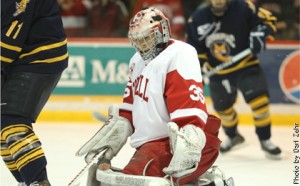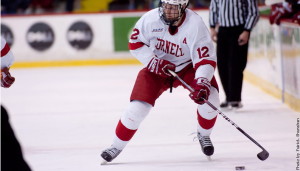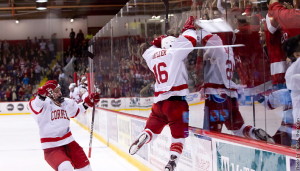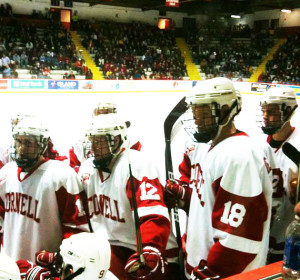Games I covered while with Slope Media, a student-run online publication at Cornell University.
Sean Collins signs with NHL’s Columbus Blue Jackets
By Tim Weisberg
Published March 31, 2012: Cornell men’s hockey player Sean Collins will continue his career beyond the college ranks, officially signing a two-year contract with the NHL’s Columbus Blue Jackets, the team announced Thursday morning.
Originally selected by the Blue Jackets in the 2008 NHL Draft as a 7th round (178th overall) pick, Collins completed one of his best seasons on the hill, finishing second on the team with a career high in goals (13) and points (26).
“There have been so many ups and downs over the four years. You just dream about something like this,” Collins said in a brief statement released by the team. “I’m just so proud and thankful of the Cornell coaches and all of my teammates.”
The Saskatoon, Saskatchewan native played in 136 games over his four-year career, and was one of the two assistant captains on a squad that was one win away from reaching the Frozen Four.
“It’s awesome watching Sean leave (Thursday) with just a huge smile on his face, realizing a dream come true of signing an NHL contract,” said Cornell head coach Mike Schafer ’86.
“He worked so hard for it and in coaching you push guys and you prod guys, inform them of the steps they need to take in order to realize their dream. Most of them listen but they don’t put those steps into place so when you see a kid like Sean who works really hard at his game to make himself a better player, it’s really rewarding to see him take that advice and lean on your experience to see what other guys have done to make them successful.”
Collins has been assigned to the Blue Jackets’ American Hockey League affiliate, the Springfield Falcons, which is based in Springfield, Mass. Collins is also the first of the four members of the class of 2012 to sign a professional contract.
For junior defenseman and assistant captain Nick D’Agostino, it is exciting to witness a teammate being able to continue to play hockey.
“Sean is a guy who really worked hard his four years here putting in the extra work before and after practice,” D’Agostino said in a phone interview. “He’s really improved year-to-year and is rewarded with (an NHL contract).”
Cornell wins first Ivy League title since ’05 with win over Yale
By Tim Weisberg
Published Feb. 11, 2012: The Cornell men’s ice hockey team flipped the switch in a 4-2 victory over Yale Saturday night at Lynah Rink, winning their first Ivy League Championship since 2005 in the process.
The Big Red (13-6-6, 10-5-3 ECAC) re-staked their claim on the Bulldogs (10-3-2, 7-10-1), a team that won the 2011 Ivy League Championship and embarrassed the Big Red 6-0 in last year’s ECAC Championship game.
It was revenge at its finest and a bit personal according to senior forward Sean Collins, who had two goals and an assist on the night.
“I don’t think we really like them as a whole,” Collins said. “We haven’t had a lot of success against them in the past so it was nice to get two wins (this season), and I don’t think they were happy losing.”
The Big Red are 2-0 against the Bulldogs this season, a far cry from a 0-3 record against them last season.
The Big Red struck first on a goal from Collins, who slapped the puck past the outstretched arm of Yale freshman goalie Connor Wilson to give the Big Red a 1-0 lead four minutes into the first period.
Up 2-0 in the second period, a roughing penalty on Cornell forward Armand de Swardt gave the Bulldogs a one-man advantage. However, an interception at center ice led to a two-on-one breakaway, as forward Locke Jillson skated past a defenseman and slapped the puck top shelf for the short hand goal and 3-0 advantage.
“To get a (short-hand goal) was big,” said head coach Mike Schafer ’86. “I thought they were just going to dump it and change (lines) but Locke (Jillson) kept on going and took the shot.”
The Cornell penalty kill unit played well, holding off six of the Bulldogs’ seven power plays.
Although a majority of the penalties were from skirmishes after the whistle, Schafer does not mind the roughing penalties.
“The penalty minutes (are) all because of scrums…I’m not concerned,” he said. “I like our attitude as far as sticking up (for each other). Being the least penalized team in the country hasn’t helped us…showing up and taking care of ourselves will.”
The Bulldogs only goal on the power play was from Brian O’Neill on a five-on-three advantage with the game well out of reach.
The Big Red received contributions from all four lines, which included goals from not only Collins, but also Jillson and freshman forward John McCarron, something Collins believe will help the team down the stretch.
“I think we’re tough to match up with when we’ve got four lines firing, and that’s going to be huge for us going into ECAC playoffs, and going into the ECAC Tournament and into the NCAA Tournament,” said Collins. “We got four lines that can match up really well against any other team in the country.”
The Big Red have four games remaining in the regular season, starting with two road games next weekend against Clarkson and St. Lawrence, and followed by a two-game home stand against first-place Union and RPI.
With the Ivy League title already clinched, the next goal is to hoist the ECAC Championship trophy and book a trip to the NCAA Tournament for the first time since 2010.
“We had a lot of practice in 2010 winning the ECAC,” said Collins. “It’d be nice to get another one come the middle of March.”
Cornell PK key to victory over Quinnipiac in ECAC Quarterfinals
By Tim Weisberg

Clean-up duty–Cornell goalie Mike Garman recorded 36 saves in a 2-1 victory over Quinnipiac Friday night at Lynah Rink. (Photo by Darl Zehr)
Published March 12, 2011: The Cornell men’s ice hockey team buried the power play six feet deep, killing off seven power play opportunities in a 2-1 victory over Quinnipiac in the ECAC quarterfinals Friday night at Lynah Rink.
Despite allowing 37 shots on goal, the Big Red (14-13-3, 11-9-2 ECAC) prevailed over the Bobcats (15-14- 8, 6-9-7) to take the first game of the best of three series.
According to Big Red goalie Mike Garman, it was the ability to stop the Bobcats from capitalizing on the power play that contributed to the victory.
“The (penalty kill) was unbelievable all night,” Garman said. “They were definitely MVP of the game there, and that’s what we got to do in the playoffs: is make big plays at times like that and I think that changes the game.”
The Big Red scored early on a Joe Devin goal less than two minutes into the first period to go ahead 1-0.
But Quinnipiac answered on a defensive turnover and scored just before the end of the first period, forcing a tie.
The Big Red did not fall behind the Bobcats despite allowing 20 shots on goal in the first period, while only getting five shots on goal.
According to sophomore defenseman Braden Birch, the prolonged layoff for the Big Red contributed to a slow start.
“I think it took us a little bit (longer) to get back into playing a gamer because we had the bye week so sometimes (the bye week) can hurt you because you aren’t use to playing in a game,” Birch said. “I think we ended up getting down and playing a little bit better.”
The Big Red retook the lead with less than 30 seconds in the second period on a power play goal from Devin, his second on the night to give the Big Red a 2-1 at the end of two periods.
The Bobcats had four power play opportunities in the final period, but were unable to capitalize.
Big Red head coach Mike Schafer seconded Garman’s notion that the penalty kill was crucial in the win over the Bobcats.
“Special teams was the difference of the game,” Schafer said. “I mean, to kill off the five-on-three (in the second period) and to come back and score a power play goal to make it 2-1 was huge for us.”
The Big Red will host the Bobcats at Lynah Rink tomorrow night at 7 p.m. A victory tomorrow night would give the Big Red the series sweep over the Bobcats, and book their ticket to Atlantic City, N.J. for the ECAC semifinals next weekend.
Schafer feels the Big Red need to come out strong from the opening faceoff, and understand that there is still another game to win in order to advance to the semifinals.
“(We) just (need) a better start…it’s just the first game (of a best of three), which is obviously the tougher to get out of the way after being off for two weeks,” Schafer said. “We had lots of energy (tonight) and I think we will come back tomorrow night and play stronger, and put these guys away.”
Big Red stunned by Harvard in 4-3 loss
By Tim Weisberg
Published Feb. 19, 2011: What is typically a Cornell hockey strong point soon became the Big Red’s Achilles heel, allowing three power play goals in a 4-3 loss to Harvard Friday night at Lynah Rink.
The Big Red (12-11-3, 10-7-2 ECAC) came in with an impressive 86 percent penalty kill percentage, but was unable to stop a potent Crimson (6-18-1, 4-13-1) offense short-handed.
According to Big Red head coach Mike Schafer, the Crimson changed technique in attacking the power play from the last the time Big Red faced them in Cambridge, Mass. on Jan. 29.
“They did a little something different on the power play than (when we played) at Harvard,” Schafer said. “You know, we obviously didn’t handle it very well.”
The Big Red went 0 for 3 on the power play, but took the first lead of the game 30 seconds into the first period on a goal from Nick D’Agostino.
However, the Crimson stormed back on a power play goal from Alex Killorn, before Michael Biega added a second goal late in the first period to give the Crimson a 2-1 lead at intermission.
The Cornell-Harvard rivalry game dates back to 1910, and Cornell fans are infamous for throwing fish onto the ice before the game as a reference to Boston’s seafood industry.
However, shortly after the Big Red tied the game at three in the third period, a delay of game was called after fans threw fish out onto the ice, putting the Big Red in a penalty kill position.
The Big Red were able to stop the Crimson, but not before much of the dismay from Schafer at the guilty fans.
“Even though we killed that (power play) off, again it just took away the momentum of scoring and getting the crowd back excited, and getting after it and putting some doubt in their mind,” he said.
It seemed only fitting that a power play goal at the 7:21 mark would prove to be the game-winner for the Crimson.
According to Schafer, the third and final power play goal only added more proof to the pudding.
“It was a tight game…they capitalized on the power play and power killing let us down and it is the first time I can say that in a long, long time,” he said.
The Big Red came into tonight’s game trailing Dartmouth (15-7-3, 11-5-2) by two points for the No. 3 spot in conference, desperately needing a win.
The Big Red hope to gain the two points in the ECAC standings when they host Dartmouth tomorrow night.
For D’Agostino, the Big Red looks to play smarter hockey against the Big Green.
“We obviously didn’t stick to the game plan tonight but it puts that much more emphasis on (Saturday) night where it’s an even bigger (game),” he said. “Hopefully we can come out and keep our emotions in check and play hockey with our heads.”
CU Powers Past Clarkson
Published Feb. 5, 2011 in Ithaca Journal: IthacaJournalHockey
Early offensive splurge ignites Big Red to victory
By Tim Weisberg
Published Oct. 22, 2010: For most teams, losing a trio of 100-point scorers, two All-American defenseman and two other prominent defenders encompasses a “rebuilding” year.
But for Cornell, the term “rebuilding” does not apply, let alone exist in their vocabulary, as the Big Red dominated in a 6-3 win over Quebec at Trois-Rivieres Saturday night in the first of two exhibition games to start the season at Lynah Rink.
It took the Big Red (1-0) less than a minute to score their first goal, and it took them just as long to never look back.
But according to Big Red head coach Mike Schafer, the ideal athlete looks beyond the scope of the game and simply plays.
“It’s a sign of a true hockey player or an athlete,” Schafer said. “…To be able to come out and maintain their focus out there, take a breather [and] step away from the action with the same intensity and forget about the score and play.”
And the Big Red came out to play, scoring five goals in the first period, including three consecutive scores in the final two and a half minutes.
According to Cornell defenseman Keir Ross, the Big Red spend a lot of energy on the ability to score during penalty periods.
“That’s obviously a big focus for our program,” Ross said. “We take a lot of pride in our defensive system and our penalty kill.”
Although the Big Red maintained a 5-0 lead, the Patriotes (0-1) scored three consecutive goals to cut the lead to 5-3 with less than eight minutes remaining in the third period.
Cornell might not be in the midst of “rebuilding,” but Schafer does believe there is room for improvement on the defensive end.
“The bigger concern is our defensive play,” said Schafer. “And that’s a harder thing to get under control at this time of year, especially with young guys.”
According to Schafer, his defensive-oriented team relies heavily on the performance of the defense.
“We’re a team that really depends on each other so much defensively, so when guys miss assignments it can make life difficult,” said Schafer.
Despite losing four key defenseman from last season, the Big Red has six returning, many of which saw extensive time on the ice.
And the Big Red defense features a strong replacement at goalkeeper in Mike Garman. Garman had 23 saves on the night, but despite all the defensive hype, it was the offense that shined for the Big Red.
The Big Red close out exhibition play when they host the US U18 National Team this Saturday at 7 p.m.
Even when exhibition games technically do not matter, Schafer believes that success is directly correlated with winning.
“There’s no substitute for winning,” said Schafer. “You have to expect it, you have to want it. You go to the game and believe it’s going to happen…and our program is built on that.”



